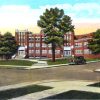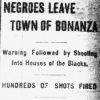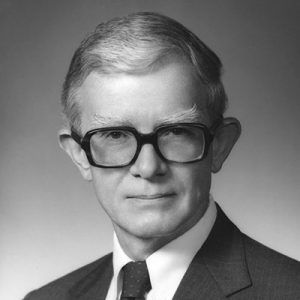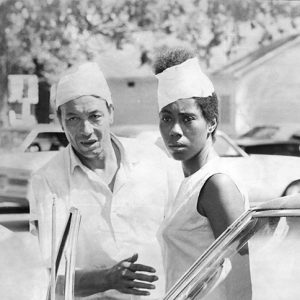calsfoundation@cals.org
Earle Race Riot of 1970
The Earle Race Riot of 1970 broke out in the late evening of September 10 and continued into the early hours of September 11, 1970. The violence erupted when a group of whites armed with guns and clubs attacked a group of unarmed African Americans who were marching to the Earle (Crittenden County) city hall to protest segregated conditions in the town’s school system. Five African Americans were wounded, including two women who were shot (one wounded seriously), but they all survived.
Among the wounded were the Reverend Ezra Greer, who was a civil rights activist, and his wife, Jackie Greer. Both of the Greers were running for elected office in Earle. Earle’s black residents had been advocating for racial justice in the months before the riot. In July, Rev. Greer’s organization, the Crittenden County Improvement Association, protested the proposed new state constitution, declaring that it was drawn up solely by white politicians. Rev. Greer, who was running for alderman in Earle, was an Illinois native who had taken part in civil rights efforts in Alabama before moving to Earle in the late 1960s. Jackie Greer was running for mayor.
Until 1970, desegregation of the schools in Earle had proceeded on a voluntary basis. Even after the federal government mandated desegregation, however, the majority of African-American students in Earle attended historically black Dunbar High School, while white students mostly attended historically white Earle High School. Earle’s population was only about 3,350, but 1,500 students were enrolled in the schools, roughly two-thirds of whom were black.
Days before the riot, on September 8, students had had taken part in a walkout as a means of protesting continued segregation and discrimination in the schools. Among other demands, black protestors insisted upon the complete desegregation of the schools, installation of a black principal, removal of white school superintendent Sam Bratton, an end to the dress code, and equal employment opportunities and pay standards. Police were called when it was reported that marchers were throwing stones and breaking windows. Earle police arrested twenty-nine protesters between the ages of thirteen and twenty; all but two were students. Police charged the protestors with marching without a permit. In response, Rev. Greer criticized the “Gestapo-like” tactics of Earle law enforcement.
Little Rock (Pulaski County) lawyers Phil Kaplan and John W. Walker filed a suit on behalf of the protestors, claiming that Earle police had not protected black picketers the previous month when they were attacked by whites for demonstrating against what they saw as prejudiced white business owners.
At around 10:00 p.m. on September 10, a group of roughly 150 black citizens met at a church in Earle and began a march on city hall, which doubled as a fire station. Sometime after midnight, a half-block from city hall, the marchers confronted a group of about thirty whites, who were armed with clubs and guns. With local police, deputized citizens, and state troopers confronting the crowd, many shots were fired—apparently by people who intended to shoot over the heads of protestors to disperse the crowd. Police denied having fired any shots during the conflict.
Ezra and Jackie Greer suffered injuries in the melee, as did two teenage girls. Jackie Greer’s head was grazed by a bullet. Rev. Greer was arrested and eventually taken to a hospital in Memphis, Tennessee, for his injuries. Greer, whose left arm was broken, claimed he had been “brutalized”—sprayed with mace and beaten. Jessie Mae Maples, who had been shot in the stomach, was hospitalized for twenty days and had her spleen, a kidney, and part of her pancreas removed; she recovered but never discovered who shot her.
Violence continued into the early morning hours. One Earle policeman claimed that African Americans were “shooting at anything that moved,” but no whites were injured. After the riot, Rev. Greer urged calm, saying that black citizens had better “cool it” and try to bring about change through the ballot box.
For days after the riot, tensions ran high in Earle. A scheduled Friday night football game was moved to the afternoon. State police attended the event, where there were only a few African-American fans and players. On Saturday, a rally was held at a black church in Earle. A curfew was imposed that kept minors off the streets after 10:00 p.m.
When schools opened on Monday, few black students attended. On September 16, Judge G. Thomas Eisele conducted a hearing concerning fourteen black Earle students’ claim that school administrators’ practices were discriminatory. The students were represented by Little Rock attorney John W. Walker. The students’ lawyer also filed for a restraining order against the town of Earle in order to lift the curfew. At one point during his testimony, Superintendent Bratton admitted that white students were given preferential treatment and never put in a classroom where they would be outnumbered by blacks. He also referred to the “nigra campus” in Earle.
Rev. Greer also testified, saying that whites had shouted, “Preach nigger, let me hear you preach,” as they were beating him. Greer conceded, though, that Mayor James King—who was also a judge and no friend of African Americans—stopped the beating once he felt Greer had “had enough.” Greer denied having incited a riot, saying he did not want to march to city hall and denied having said he wanted to burn Earle to the ground.
On October 2, 1970, Judge Eisele ordered the complete desegregation of Earle’s schools. Mayor King complained, “The federal government comes in here and tells us you been discriminating against them niggers…then every damn radical in the country comes along and says the same thing. Hell! There ain’t a white person laid a hand on Greer until the night they had that march.”
On October 5, three days after Eisele’s ruling, in further protest against racist conditions in the school system, black citizens in Earle created the Soul Institute, which conducted classes in the offices of the Crittenden County Improvement Association. Among the staff of teachers was Jackie Greer. The Soul Institute was never accredited, and it shut its doors after a few months in operation. Dunbar High School also closed and never reopened following the desegregation order.
In January 1971, Rev. Greer was convicted in a West Memphis (Crittenden County) court of inciting a riot and was sentenced to a year in jail and ordered to pay a $500 fine. The sentence, however, was suspended. He continued his civil rights activities, leading a march in honor of Dr. Martin Luther King Jr. in January 1971 in Earle. In June, he met Dale Bumpers in the governor’s office and spoke at a rally in Little Rock to protest war and poverty. “We don’t want no handpicked niggers no more,” Greer said at the rally. “We’re gonna take a part of the action or die trying.”
For additional information:
“Council Report Says Policemen and Civilians Fired Guns, Beat Blacks at Earle.” Arkansas Gazette, December 2, 1970, p. 13A.
Interview with Jackie Greer. Butler Center for Arkansas Studies, Central Arkansas Library System, Little Rock, Arkansas.
“Rally Meets at Capitol, Protest War & Poverty.” Many Voices 1 (June 16–30, 1971): 1, 7.
Richards, Eugene. The Day I Was Born. Brooklyn, NY: Many Voices Press, 2020.
Simmons, Dana. Interview with Jessie Mae Maples. April 12, 1994. Oral History Collection. Center for Arkansas History and Culture. University of Arkansas at Little Rock, Little Rock, Arkansas.
“Slate Report to Arkansas Governor on Brutal Beatings.” Jet (October 22, 1970): 6–8.
Tieken, Mara Casey. Why Rural Schools Matter. Chapel Hill: University of North Carolina Press, 2014.
Winthrop Rockefeller Collection. Center for Arkansas History and Culture. University of Arkansas at Little Rock, Little Rock, Arkansas.
Colin Edward Woodward
Lee Family Digital Archive, Stratford Hall
 Civil Rights and Social Change
Civil Rights and Social Change Divergent Prosperity and the Arc of Reform, 1968–2022
Divergent Prosperity and the Arc of Reform, 1968–2022 Education, Elementary and Secondary
Education, Elementary and Secondary Race Riots
Race Riots G. Thomas Eisele
G. Thomas Eisele  Ezra and Jackie Greer
Ezra and Jackie Greer 



Comments
No comments on this entry yet.